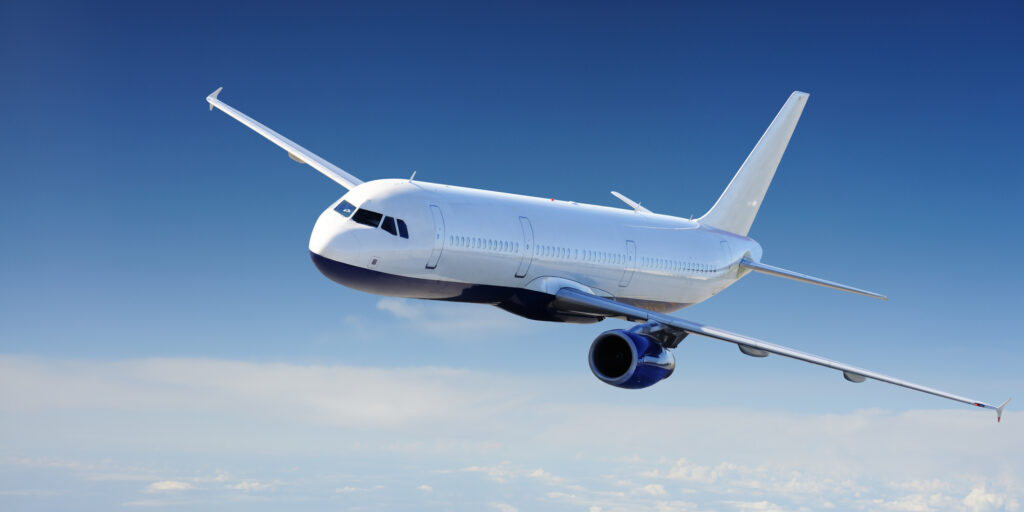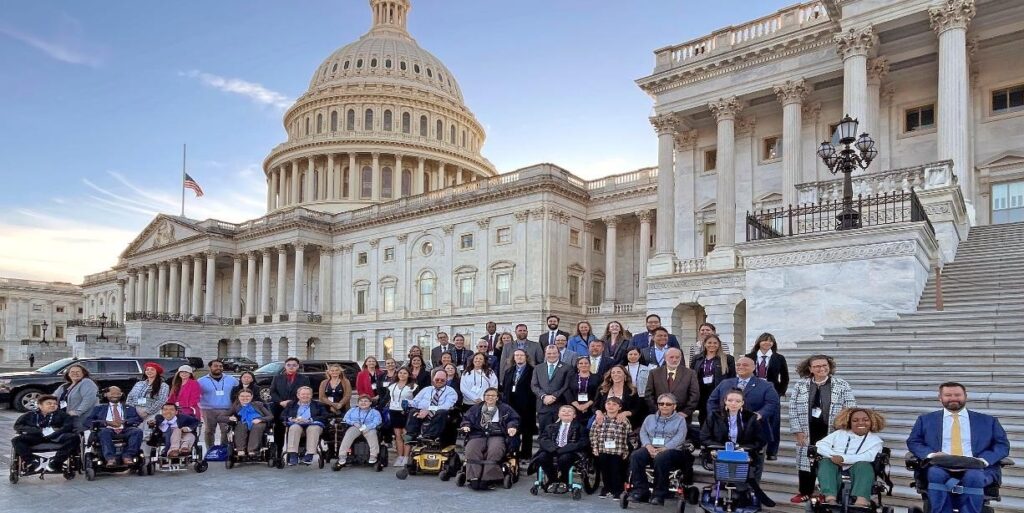
A Year of Progress: Looking Back on the 2024 Changes in Air Travel Accessibility
By Shannon Wood | Wednesday, December 4, 2024
As 2024 draws to a close, it is worth reflecting on the progress MDA and the disability community achieved this year towards air travel accessibility. From the inclusion of important accessibility provisions in the Federal Aviation Administration (FAA) reauthorization to unprecedented fines on airlines for violating the rights of passengers with disabilities who use mobility devices, MDA advocates have much to celebrate and look forward to in the future. Let’s take a look at some of the accomplishments made towards safe and dignified air travel for people with disabilities in the past year – and what’s ahead.
FAA Reauthorization
In May of this year, President Biden signed into law the bipartisan FAA Reauthorization Act of 2024, which included several provisions to improve air travel accessibility for people with disabilities. These provisions include: strengthened training requirements for those assisting passengers with limited mobility, as well as for those who stow wheelchairs and assistive devices; improvement of the disability complaint process with the Department of Transportation; continued study into in-cabin wheelchair tie down systems; greater reporting requirements of mishandled wheelchair data; reauthorization of the Air Carrier Access Act Advisory Committee; new requirements related to the availability of onboard wheelchairs; and the creation of a service animal pilot program.
Passage of this important law was in no small part due to the action and efforts of MDA advocates and volunteers, who advocated for increased air travel accessibility at the 2023 MDA on the Hill and in the months leading up to the FAA reauthorization bill passage by Congress. Advocates living with neuromuscular disease held over 30 meetings with Congressional offices and sent over 11,500 messages to the Hill.
American Airlines Fine
In October, the U.S. Department of Transportation announced that it was levying a $50 million penalty against American Airlines after finding the air carrier violated laws protecting passengers with disabilities. In its investigation, the Department found that between 2019 and 2023, American Airlines provided ‘unsafe physical assistance that at times resulted in injuries and undignified treatment of wheelchair users, in addition to repeated failures to provide prompt wheelchair assistance’, as well as mishandling thousands of wheelchairs by damaging them or delaying their return.
The amount of the fine was historic, with the largest disability enforcement action prior to this fine being in the amount of $2 million. Of the $50 million, $25 million will be paid to the U.S. General Treasury Fund, where most civil penalties go, in three installments over three years. The remaining $25 million will be credited to American Airlines in the form of offsets, which could include investments in equipment to reduce wheelchair damage, wheelchair lifts used to safely lower wheelchairs from the jet bridge down to the tarmac, investments in system-wide wheelchair tagging systems, and other offsets. These offsets are not credited at 100% or valued dollar-for-dollar, meaning American Airlines will spend more than the $25 million needed to receive the $25 million credit.
This fine showed a strong commitment by the Department of Transportation to investigate complaints and enforce laws protecting airline passengers with disabilities. It also demonstrates the importance of people with disabilities submitting complaints to the Department when they are injured, mistreated, or have their equipment mishandled.
Looking Ahead
In this year’s FAA reauthorization law, Congress required the Department to take certain actions by certain deadlines, depending on the provision. For example, on the issue of lithium-ion powered wheelchairs, there was a requirement for the Department to ask the Air Carrier Advisory Committee to do a review of regulations related to this issue and provide recommendations within two years. The ACAA Advisory Committee, reauthorized in this year’s bill, has been selected and will be working on this issue moving forward.
With regards to improved training for those assisting wheelchair users or stowing wheelchairs, a notice of proposed rulemaking was required within 6 months of enactment with a final rule required by 12 months (May 2025). The Department is still working on reviewing public comments that were due in June, and MDA has been working actively to urge the Department to finalize the rule by the end of the year.
The Department of Transportation issued a final rule on December 17, 2024, strengthening protections for passengers with disabilities. The final rule can be found here, and includes several references to MDA’s organizational comments on the proposed rule.
The Department is behind on implementation of other requirements, including the seating accommodations rule, which has been required by the FAA law since 2016. The inflight entertainment accessibility rule is also similarly delayed. Other requirements don’t have a deadline or have a longer time for execution. Looking to the new administration, MDA will continue to advocate regarding the requirements of the bill and urge them to complete their work by given deadlines, even if it is uncommon for those deadlines to be met.
Research & Development Advancements in Accessible Travel
This fall, the Federal Aviation Administration shared that the Department of Transportation is working on setting safety parameters for testing and certification of in-cabin wheelchair restraint systems starting in 2025. So far, the FAA has not found any major issues with installation of the restraints and will determine feasibility by the end of next year. While work remains to be done, this is a significant step forward towards flying in one’s wheelchair.
Once safety standards are in place, it is up to airlines and manufacturers to actually create the in-cabin restraint system, but there is already interest from air carriers. Delta Air Lines submitted early concept designs to the FAA and displayed early concepts at the Aircraft Interiors Expo this year, as did Airbus at the APEX Global Expo. It would be up to the Department of Transportation to mandate these accommodations for all carriers.
Your voice can make a difference
While there is still work to be done towards a future with the ability to fly in one’s wheelchair, advocates made remarkable progress this year towards improved air travel accessibility. We need the powerful voices and stories of the neuromuscular disease community as we continue our advocacy efforts on accessible air travel. To engage with us as an advocate, join our Action Network: https://www.votervoice.net/MDA/home
Next Steps and Useful Resources
- To connect with the MDA Advocacy Team and become an advocate, join our Action Network: https://www.votervoice.net/MDA/home
- Stay up-to-date on Quest content! Subscribe to Quest Magazine and Newsletter.
Disclaimer: No content on this site should ever be used as a substitute for direct medical advice from your doctor or other qualified clinician.




